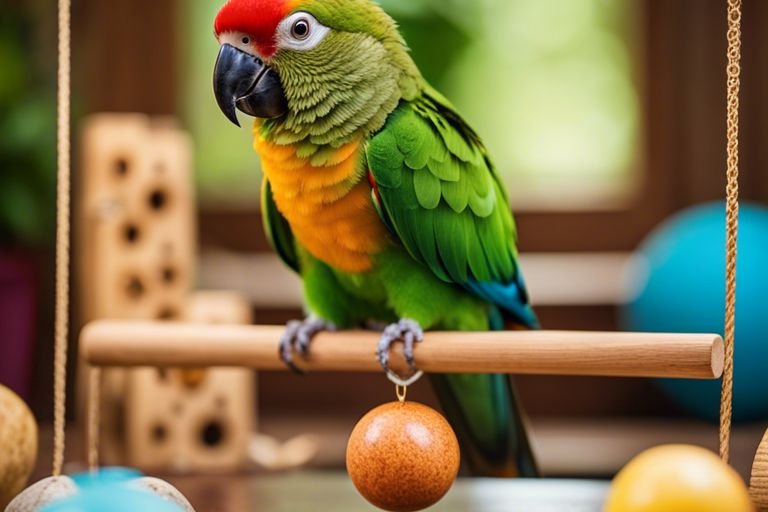How Long Do Conures Live – Understanding the Lifespan of Your Feathered Friend
- Home
- How Long Do Conures Live – Understanding the Lifespan of Your Feathered Friend

How Long Do Conures Live – Understanding the Lifespan of Your Feathered Friend
As a bird enthusiast, understanding the lifespan of your pet conure is essential for providing the best care possible. Conures are known for their vibrant colors, playful personalities, and impressive intelligence. However, many owners are unaware of the longevity of these feathered friends. Conures can live for an average of 15 to 30 years, with proper care and attention. Factors such as diet, environment, and genetics play a significant role in determining the longevity of your conure. In this blog post, I will delve into the important details surrounding the lifespan of conures, as well as tips for helping your feathered friend live a long and healthy life. By the end of this post, you will have a better understanding of the lifespan of conures and how to ensure your pet lives to its fullest potential.
Key Takeaways:
- Conures can live up to 20 to 30 years: With proper care and attention, conures have a long lifespan, making them a long-term commitment for potential owners.
- Proper diet and exercise are crucial: A balanced diet and regular exercise are essential for maintaining the health and longevity of conures.
- Regular veterinary check-ups are important: Annual check-ups and prompt medical attention for any health concerns can help extend the lifespan of conures.
- Enriching their environment is beneficial: Providing mental stimulation and a variety of toys and activities can improve the overall well-being and lifespan of conures.
- Genetics and species can play a role: Different species of conures and individual genetics can impact the lifespan of each bird, so it’s important to be aware of the specific factors that may affect their longevity.
Lifespan of Conures
Before we delve into the factors that affect the lifespan of conures, let’s discuss the general lifespan of these colorful birds. As a conure owner, it’s important to have a clear understanding of how long you can expect your feathered friend to live. By knowing the average lifespan of conures, you can better prepare for their long-term care and make informed decisions about their well-being.
Factors Affecting Lifespan
There are several factors that can greatly impact the lifespan of conures. These include diet, exercise, genetics, and overall care. Providing your conure with a balanced diet that includes a variety of fruits, vegetables, pellets, and seeds is crucial for their health and longevity. Regular exercise and mental stimulation are also important to keep your conure active and healthy. Additionally, genetics play a role in determining the lifespan of your conure, so choosing a reputable breeder is essential. Lastly, providing proper veterinary care and a safe living environment can also contribute to a long and healthy life for your feathered friend. Assume that by ensuring these factors are met, you can help maximize your conure’s lifespan.
Average Lifespan of Different Conure Species
When it comes to the average lifespan of different conure species, there are a few variations to consider. On average, conures can live anywhere from 15 to 30 years, with proper care and attention. The smaller conure species, such as the green-cheeked conure, tend to have a slightly shorter lifespan, averaging around 15 to 20 years. On the other hand, larger conure species like the sun conure and blue-crowned conure have been known to live up to 30 years or more. It’s important to note that these are just averages, and with exceptional care, some conures may live even longer.
Health and Care for Longevity
The health and care of your conure is essential for ensuring a long and happy life. By providing proper nutrition, regular exercise, mental stimulation, and regular veterinary check-ups, you can help your feathered friend live a full and healthy life.
Proper Nutrition and Diet
Conures require a diet that is high in fruits, vegetables, and high-quality pellets. I highly recommend providing a variety of fresh foods to ensure that your conure receives all the essential vitamins and nutrients. Avoid feeding your conure foods that are high in fat, sugar, or sodium, as these can lead to health issues. Remember to always provide fresh water and monitor your conure’s food intake to prevent obesity.
Exercise and Mental Stimulation
Regular exercise is crucial for your conure’s physical and mental well-being. I recommend providing ample opportunities for your conure to fly, climb, and play. Additionally, mental stimulation is essential for preventing boredom and behavioral issues. Provide toys, puzzles, and interaction with you to keep your conure mentally engaged and happy.
Veterinary Care and Preventative Measures
Regular veterinary check-ups are crucial for detecting any health issues early and ensuring your conure’s overall well-being. I recommend finding an avian veterinarian who is experienced in treating birds. Additionally, be proactive in preventing common health issues by providing a clean living environment, monitoring for signs of illness, and keeping your conure’s beak and nails trimmed. Regular check-ups and preventative measures can significantly contribute to your conure’s longevity.
Environmental Factors
Keep temperature and humidity levels in your home consistent to ensure a comfortable and healthy environment for your conure. Additionally, make sure to minimize exposure to toxic fumes such as smoke, aerosols, and household cleaners. Consistent exposure to these factors can significantly impact the lifespan of your feathered friend.
- Temperature and humidity levels
- Toxic fumes
- Consistency in environmental factors
After all, the environmental conditions in which your conure lives can greatly influence its overall health and longevity.
Housing and Cage Requirements
When it comes to housing your conure, it’s important to provide a spacious cage with enough room for them to move around and comfortably stretch their wings. Additionally, make sure the cage bars are appropriately spaced to prevent injury and ensure that they have access to toys and perches for mental and physical stimulation.
Socialization and Enrichment
Socialization and enrichment are key factors in determining the lifespan of your conure. Regular interaction and mental stimulation through playtime and training can help prevent behavioral issues and contribute to their overall well-being.

Conclusion
Taking this into account, it is important to understand the longevity of your conure in order to provide them with the best care throughout their lives. With proper diet, exercise, and environmental enrichment, conures can live anywhere from 15 to 25 years. By providing them with a healthy and stimulating environment, you can help ensure that your feathered friend lives a long and fulfilling life. It’s important to monitor their health and behavior, and to consult with a veterinarian if you have any concerns. With the right care and attention, you and your conure can enjoy many happy years together.
FAQ
Q: What is the average lifespan of a conure?
A: Conures typically live for 20 to 30 years, but with proper care and a healthy diet, they can live even longer.
Q: What factors can affect the lifespan of a conure?
A: The lifespan of a conure can be influenced by genetics, diet, exercise, veterinary care, and the overall environment in which the bird lives.
Q: How can I ensure a long and healthy life for my conure?
A: To promote a long and healthy life for your conure, provide a well-balanced diet, regular exercise, mental stimulation, plenty of social interaction, and routine veterinary check-ups.
Q: What are some common health issues that can affect the lifespan of a conure?
A: Some common health issues in conures include respiratory infections, avian pox, vitamin deficiencies, and obesity. Regular veterinary check-ups are essential for early detection and treatment of these conditions.
Q: How can I help my conure live a happy and fulfilling life as it ages?
A: As your conure ages, it’s important to provide comfortable living conditions, mental stimulation, and adapt their diet and exercise regimen to accommodate any age-related changes in their health and mobility. Additionally, continue to provide social interaction and love to ensure your conure’s happiness and well-being.
- Share
Mark Twain
Mark Twain stands at the helm of Create More Flow, infusing every sentence with the wisdom of his 15-year expeience through the seas of SEO and content creation. A former BBC Writer, Mark has a knack for weaving simplicity and clarity into a tapestry of engaging narratives. In the realm of content, he is both a guardian and a guide, helping words find their flow and stories find their homes in the hearts of readers. Mark's approach is grounded in the belief that the best content feels like a chat with an old friend: warm, inviting, and always memorable. Let Mark's expertise light up your website with content that's as friendly to Google as it is to your audience. Each word is chosen with care, each sentence crafted with skill - all to give your message the human touch that both readers and search engines love.
